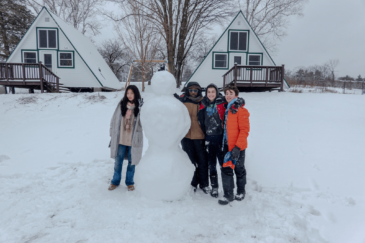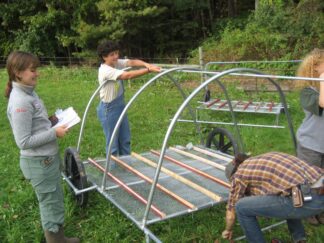In Light of Fear
March 25, 2020
3 min read

When I find myself compelled, troubled, or otherwise wondering about something, I often turn to etymology to deepen my understanding of the thing in question. In all my conversations with friends and family over the past days, two words keep coming up when reflecting on our collective reaction and response to the presence of this virus: panic and fear. They seem similar at first, and indeed they are related, but examining the long history of these words in our world tells us more.
Panic is a relatively new addition to the English language, appearing in the early 1600s but deriving from an old Greek source. If you have any 5th graders in a Waldorf school, then they could probably tell you about the Greek god Pan—god of the wild, but also of shepherds and their flocks. Pan was said to cause “contagious fear” in herds and crowds when he was woken suddenly from his midday naps; otherwise he was generally peaceful. This sense of suddenness remained in the word for a long time. Panic, for centuries, has referred to a sudden and unreasoning fear, as though what is feared was not and could not have been known before it visited itself upon the flock or herd.
What about fear? This is a much older English word, with roots and cognates in a variety of old European languages. Most recently, fear refers to an uneasiness caused by possible peril—in fact, some of the oldest roots of this word refer specifically to “ambush” or “one who lies in wait.” Peril itself carries with its meaning the possibility of danger; danger in turn has meant “arrogance” in Old English, and “mastery with the power to harm” in Old French. Fear also comes to us from even older tongues to mean “a trial, to test through an ordeal.”
Panic and fear start to sound very different from this perspective. The former presumes that the instigator was sudden, unknown and unknowable, and may as well have been from the divine realm for all we could have done about it. The latter, however, resonates with response-ability. Something may yet occur, something we can know but little about, yet we are faced with it all the same: what now will we do? Fear does not mean “run away screaming,” not necessarily. Something else may be called for when Fear appears. Something may be being tested.
How well do we know our world, really? Could it be that the surges of shopping at grocery stores are, in part, a reflection of our increasing distance from where food comes from, from where a hot meal comes from? Could it be that this virus illustrates the ways our personal connections are in need of repair—ways that we assume we hold each other but in fact do not? Can we show deep and abiding companionship or fellowship with others and still be 6 feet away? Could it be that this virus calls us to be closer together, even as it demands that we space ourselves further apart?



